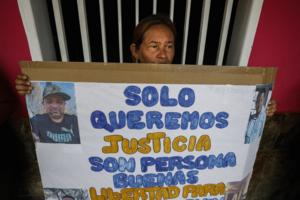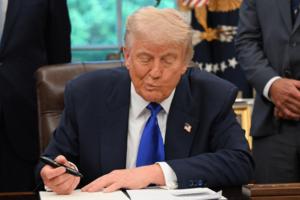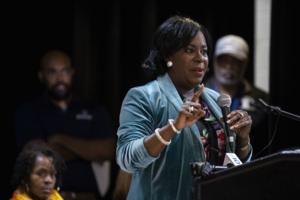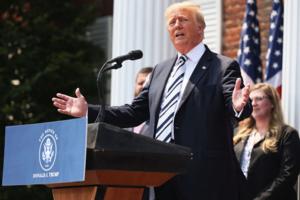Current News
/ArcaMax

Bessent, Greer to meet China to start trade talks this week
WASHINGTON — U.S. Treasury Secretary Scott Bessent and U.S. Trade Representative Jamieson Greer will travel later this week to Switzerland for trade talks with China led by Vice Premier He Lifeng, jump-starting negotiations between the two nations.
The travel was announced in statements Tuesday from the Chinese and U.S. governments. It will ...Read more

Federal judge grants injunction, indefinitely bars Trump's use of Alien Enemies Act in Colorado
DENVER — A federal judge on Tuesday granted a preliminary injunction to indefinitely limit President Donald Trump’s administration from deporting Venezuelan immigrants in Colorado under the Alien Enemies Act.
U.S. District Judge Charlotte Sweeney also granted a request from the American Civil Liberties Union to turn the civil case into a ...Read more

Florida will ban water fluoridation amid battle between public health, personal freedom
Florida will become the second state in the nation to prohibit fluoridation of public water supplies, reversing decades of public health policy in favor of a new mindset that discounts experts and embraces individual autonomy.
“It’s forced medication when they’re jamming fluoride. And they did it because if you have fluoride, it’ll help...Read more

Barbie doll prices spike as Trump tariffs loom
With President Donald Trump warning that his tariff policy may cause the price of toys to spike, a Barbie with swimsuit accessories that cost $10.49 on April 16 is now selling at Target for $14.99 — marking a 43% increase.
While it’s not clear if the higher price is directly linked to tariffs, toymaker Mattel reportedly confirmed its plans ...Read more

Duffy says air traffic overhaul to cost tens of billions of dollars
WASHINGTON — Transportation Secretary Sean Duffy said Tuesday that his proposal to overhaul the U.S.’s air traffic system, which he plans to unveil May 8, will cost “tens of billions” of dollars.
Urgency around upgrading the Federal Aviation Administration’s aging system has grown after a radar and radio outage early last week at the...Read more

Girlfriend of NJ wildfire suspect tells friend, 'We started the fire,' affidavit says
The girlfriend of a 17-year-old arrested in connection with a massive wildfire in New Jersey last month allegedly admitted to a friend that her group started the blaze, court documents show.
“We started the fire,” she wrote to a classmate in a Snapchat message, according to an affidavit of probable cause obtained by NJ Advance Media.
The ...Read more

CSU students start 'indefinite' hunger strike in support of Palestinians
Around two dozen California State University students say they have started an “indefinite” hunger strike in support of Palestinians facing starvation in Gaza amid the Israel-Hamas war.
Students are demanding each CSU campus and the California State University system as a whole adopt policies divesting from companies that “supply weapons,...Read more

Polls show Trump's approval rating 'stabilized' but underwater
President Donald Trump’s international trade war may not be as popular as he might wish, but his approval rating hasn’t suffered as a consequence, new polling shows.
According to a Morning Consult survey of more than 2,200 registered voters, Trump’s approval rating has “stabilized” but remains underwater.
“Sentiment about Trump’s...Read more

Michigan Senate votes to let schools decide their own cellphone policies
LANSING, Mich. — The Michigan Senate voted overwhelmingly Tuesday to require school districts to develop their own policies on the use of cellphones by students, avoiding a stricter statewide ban that had been sought by some lawmakers.
The Senate supported the bill in a vote of 28-9, with nine Republicans, including Senate Minority Leader ...Read more

Philadelphia Mayor Parker's administration says it is ready 'to litigate' if city's funding is put at risk under Trump sanctuary order
PHILADELPHIA — An official from Mayor Cherelle L. Parker’s administration said Tuesday that they are prepared to go to court if federal authorities identify Philadelphia as a so-called “sanctuary city” and decide to revoke its federal funding under a new executive order signed by President Donald Trump.
City Solicitor Renee Garcia on ...Read more

Court of Appeals denies resentencing appeal by Michigan school shooter
DETROIT — A three-judge panel of the Michigan Court of Appeals on Tuesday denied the Oxford High School shooter's requests to withdraw his guilty plea or be resentenced after an Oakland County judge declined to do both.
In a brief order issued Tuesday, Court of Appeals Presiding Judge Randy Wallace wrote that the requests were denied for a "...Read more

Trump says US will stop Houthi strikes after Oman-brokered deal
WASHINGTON — President Donald Trump said the U.S. would stop its bombing campaign against Houthis in Yemen after a ceasefire was facilitated by Oman, even as the group pledged to keep targeting Israel over its Gaza campaign.
“They just don’t want to fight,” Trump said in an Oval Office Tuesday morning during a meeting with Canadian ...Read more
News briefs
Polls show Trump’s approval rating ‘stabilized’ but underwater
President Donald Trump’s international trade war may not be as popular as he might wish, but his approval rating hasn’t suffered as a consequence, new polling shows.
According to a Morning Consult survey of more than 2,200 registered voters, Trump’s approval rating has ...Read more

Shake-up at EPA threatens Energy Star, climate offices
WASHINGTON — A proposal by the Trump administration to reorganize the Environmental Protection Agency targets divisions that house its climate change offices as well as Energy Star, a widely popular program designed to help lower energy costs for American households.
A chart of the proposed reorganization reviewed by the Los Angeles Times on ...Read more

New Wash. state law requires priests to report child abuse. DOJ calls it 'anti-Catholic'
A new Washington state law requires Catholic priests and other religious community leaders of different faiths to report potential child abuse to state authorities.
But does the law signed by Gov. Bob Ferguson on May 2 raise constitutional issues?
The question is central to a new federal civil rights probe launched under President Donald Trump...Read more

Karen Read retrial: Angry voicemails and sudden taillight pieces
DEDHAM, Mass. — Jurors heard Karen Read’s furious and jealous voicemails left among 52 calls she made to her boyfriend John O’Keefe in the hours after she had allegedly killed him.
“John, I (expletive) hate you!” Read screamed in the first voicemail at 12:28 a.m. on Jan. 29, 2022.
In all there were eight voicemail messages over 52 ...Read more

Trump's immigration policies will cost Massachusetts billions, experts say
BOSTON — President Donald Trump’s campaign-promised plan to send millions of immigrant residents back to their home countries and his administration’s proposals to sharply curtail the number of immigrants legally allowed to enter the U.S. will have severe economic impacts on Massachusetts, according to a pair of experts.
Academic work ...Read more

Russian man given US asylum caught with stolen $2.5 million yacht, Florida cops say
A Russian man with a North Carolina address is at the center of a “bizarre” grand theft case involving two boats stolen within hours of each other in Florida, including a $2.5 million luxury yacht, according to investigators.
Nikolai Vilka was arrested Monday, May 5, during a dramatic boat chase that ended when multiple patrol boats ...Read more

Google reserves key search data for Gemini, not rival AI apps
Google last year began offering some artificial intelligence firms a way to anchor chatbot responses in its search results, but still reserves key features for its own AI service, Gemini, a company executive testified.
Liz Reid, Google’s head of search, was describing in court Tuesday how the Alphabet Inc. unit handles requests for its data ...Read more

California legislators are protesting Trump's cuts to Head Start -- even Republicans
On Tuesday, a bipartisan group of legislators in Sacramento released a letter urging California's congressional delegation to protect the embattled Head Start program and reject any proposed Trump administration cuts.
The letter, which was signed by over three-quarters of state lawmakers, said they are "deeply alarmed" by a growing list of cuts...Read more
Popular Stories
- Sen. Thom Tillis splits from Trump on Washington's top prosecutor, citing Jan. 6
- Groups call on Trump administration to curb wasteful use of Colorado River water
- Times Square migrant gang linked to Tren de Aragua attacked NYPD with scooters, basketballs, bottles
- 'Something's got to give': Rubio takes on dual roles as Trump's Ukraine talks stall
- Alexandria Ocasio-Cortez won't run for Oversight Committee opening despite Jeffries boost





